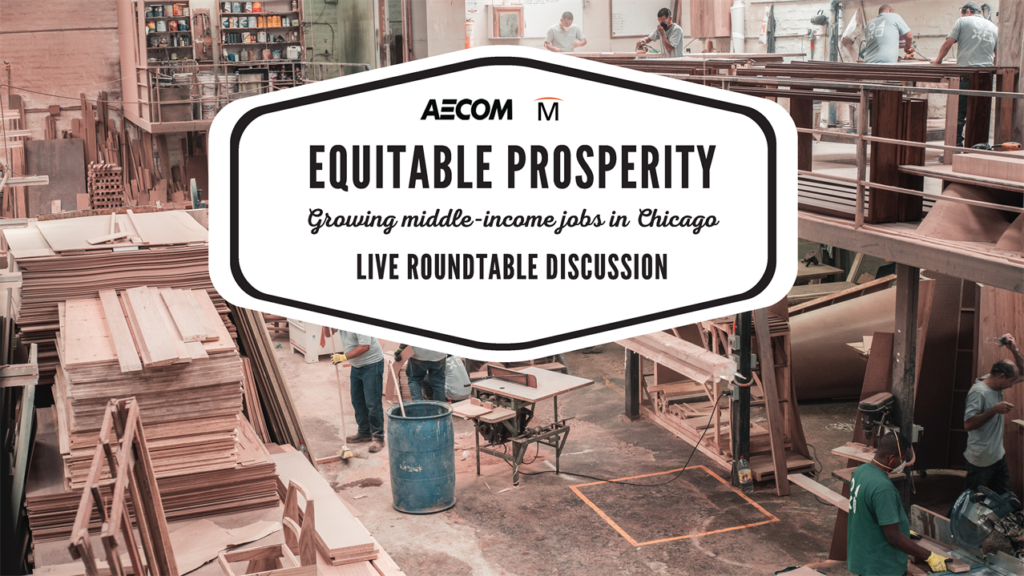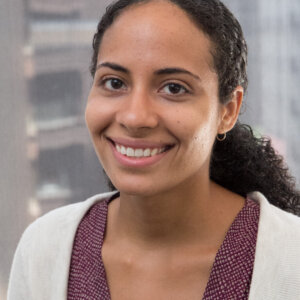Equitable Prosperity: A Conversation on How To Grow Middle-Income Jobs

More than 250 attendees joined MPC and AECOM for a discussion about the challenges and solutions to growing and maintaining middle-income jobs in Chicago.
The Coronavirus pandemic has made it clear that communities and individuals have not been well served by the current economic system, with many unable to afford basics like housing, food and utilities. New, creative approaches are needed to help the Chicago region plan for an equitable response and build back better than before this crisis.
Introduction and Background: Industrial Corridors in Context
More than 250 attendees joined MPC and AECOM on June 24, 2020 for a discussion about the challenges and solutions to growing and maintaining middle-income jobs in Chicago by prioritizing industrial corridors. Middle-income jobs provide wages and benefits that support families, and require policy and infrastructure to bolster employees and neighborhoods. The panel discussion began with a brief introductory presentation by AECOM Vice President Bill Abolt that provided context and data to ground the conversation in the current challenges and opportunities presented by Chicago’s industrial corridors. Bill’s presentation revealed that there has been 4.2% annual job growth in industrial corridors from 2010 to 2017, which is faster than the Chicago average of 2.6%. There is also a $9,000 wage premium for workers in industrial corridors compared to average Chicago resident income.
There has been 4.2% annual job growth in industrial corridors from 2010 to 2017, which is faster than the Chicago average of 2.6%.
After Bill spoke, the event pivoted to a lively discussion, moderated by MPC Vice President Josh Ellis, featuring nine panelists who work on connecting employees and employers to job opportunities and advocate on behalf of communities to ensure those opportunities benefit the community. The panelists represented a broad range of experience across numerous nonprofit and nongovernmental organizations, and city agencies, including:
- Karin Norington-Reaves, CEO from the Chicago Cook Workforce Partnership
- Ayom Siengo, Vice President, Community and Strategic Partnerships from Skills for Chicagoland’s Future
- David Doig, President of Chicago Neighborhood Initiatives
- Juan Salgado, Chancellor of City Colleges of Chicago
- Olga Bautista, Planning Manager for the Alliance for Great Lakes
- Meleah Geertsma, Senior Attorney and Midwest Director, Health Equity and Water for the Natural Resources Defense Council
- Dan Lurie, Chief of Policy for the City of Chicago’s Mayor’s Office
- Delmar Gillus, Jr., Chief Operating Officer of Elevate Energy
Roundtable Panel Discussion: Challenges and Solutions
The panel kicked off with a discussion of the challenges facing residents, communities, employers, and ultimately Chicago in growing middle-income jobs. Juan Salgado, Chancellor, City Colleges of Chicago, and Ayom Siengo, Vice President, Skills for Chicagoland’s Future expressed the need to connect employers in Chicago’s disinvested minority communities with potential pools of employees. They also highlighted the need to invest in training and job placement programs that keep pace with and match the needs of employers and industries, as well as taking advantage of increases in job demand brought on by COVID-19.
Chris Brewer, Vice President at AECOM, discussed the challenges of fundamental changes to the nature of manufacturing over the last few decades, changes driven primarily by technology. He also noted the new dynamics of what an “industrial” job of the future is compared to a “manufacturing” job of the past. David Doig, President, Chicago Neighborhood Initiatives, discussed the need for community developers to use an asset-based approach to job development in Chicago’s South and West Sides. Focusing on existing infrastructure and transportation assets to attract advanced manufacturing and distribution employers, in partnership with Community Benefits Agreements have been successful in drawing high-profile employers to some disinvested communities. He also pointed out the need for more robust industrial corridor land use and development planning.
Karin Norington-Reaves, CEO, Chicago Cook Workforce Partnership, and Delmar Gillus, Chief Operating Officer, Elevate Energy, provided an overview of challenges and success they’ve experienced in on-the-ground workforce development for high quality jobs in Chicago. Karin reiterated that racial equity is a workforce development issue, noting that the most entrenched roots of poverty are in majority black and brown communities, and that helping employers understand the untapped potential of community members, and pushing through stigmas of community members’ abilities is key to working towards a solution. She also discussed the challenges of historically siloed “train and pray model” job programs and the necessity for workforce development programs to be created collaboratively with employers, and ensure potential employees are job ready so that community members can be trained for jobs that are actually available. Delmar agreed with Karin’s assessment of the challenges facing workforce development programs and the need to connect employers and job opportunities with community members through partnership and collaboration.
Olga Bautista, Planning Manager from the Alliance for Great Lakes, clarified the need for a balance between job creation and community and public health. She highlighted the historical patterns of employers creating jobs that bring with them detrimental health effects that residents have to deal with long-term. Residents are left with legacy pollution and contamination long after industries have left and abandoned the community.
Meleah Geertsma, Senior Attorney from the Natural Resources Defense Council, in line with Olga’s sentiments highlighted a map of the City of Chicago Cumulative Environmental and Socio Demographic Burdens. The diagram showed how environmental burdens are not separable from socio-economic status, and that low-income, black and brown neighborhoods adjacent to industrial corridors bear a disproportionate burden of environmental racism. Meleah echoed Olga, stating that the need for jobs should not overshadow the need to address inequitable policies that lead to pollution and contamination in communities of color. She closed with a powerful statement about the opportunity present in the current Covid-19 moment to be bold and not double down on what we have been doing, but to question if the moves we are making are actually paying off equitably in the short- and long-term for Chicago’s disinvested communities and residents.
In addressing the need for policy and planning change at the City, Dan Lurie from the Mayor’s Office stated that the City is looking to help create change in the way resources have distributed to allow for more equity but needs help and support from all of the panelists and others in able to ensure that there are the networks and solutions put in place to ensure that residents can connect to community beneficial, high paying jobs. The Mayor’s Office is ready to make the changes needed to help advance these goals.
Takeaways: Collaboration and Partnership
Each participant shared their perspective on the challenges and opportunities facing communities, residents, and employers in creating middle-income long-term employment. But, similarly, all of the panelists, in one way or another, emphasized the necessity of collaboration and partnership within their work. Collaboration and partnership is needed not only between employers and job seekers, but also among organizations, workforce training programs, and city agencies. The panelists agreed that viable planning and policy solutions to grow middle-income jobs and tackle the inequities in Chicago can only begin through a framework that prioritizes both collaboration and partnership. We hope this panel helped set the groundwork for the growth of these types of relationships into the future.
This program is part of a series of infrastructure implementation programs hosted by MPC, SPUR in San Francisco, and New York’s Regional Plan Association (RPA), in collaboration with AECOM. MPC thanks AECOM in helping put this event together.
